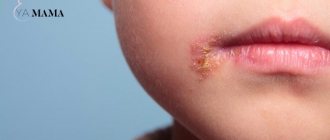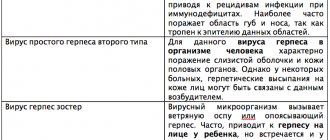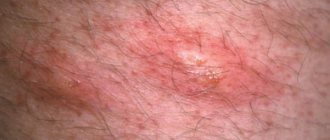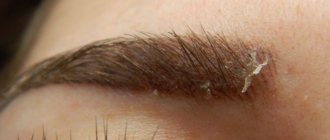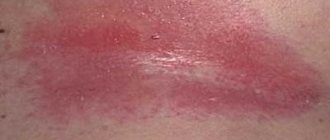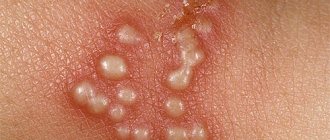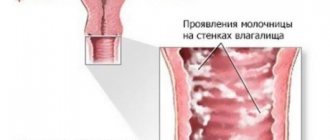STD
Herpes is a true family of DNA viruses. An infection in the anus is caused by a herpesvirus and produces unpleasant symptoms. Anal herpes is an unpleasant disease, not many people know about it.
The virus quickly begins to spread after unprotected sexual intercourse and begins to attack. Having penetrated the human body once, the infection will remain there forever.
Symptoms of the disease
- Injections and pills
- Methods of protection
Causes of rectal herpes
Herpes in the anus
Virus rashes in the anal area occur as a result of the method of sexual intercourse. Keep in mind that the same type of virus can be localized in other places, for example, herpes on the butt can be classified here.
And if previously it was believed that two types of the virus “distribute” “responsibilities” among themselves: the 1st type is localized on the face, and the 2nd in the intimate area in the anal and genital area, now there is no clear distinction.
The virus adapts to different conditions, and unconventional methods of sexual relations “help” it with this.
In addition to these methods of transmitting herpes to the anus, there are others:
- anal sex;
- sexual caresses;
- infection of the child during childbirth, during the passage of the birth canal;
- use of personal hygiene items - underwear, towels;
- the infection can spread to the anus if there is genital herpes, including herpes on the labia, and in men watery bumps appear on the penis.
Video
In this video, they will tell you in more detail whether you should worry about itching in the anus and how to deal with it.
With timely treatment and proper treatment, herpes in the anal canal can be cured in just a few weeks. Unfortunately, it is impossible to completely destroy the virus; it will remain in the body for the rest of its life. However, its exacerbation can be prevented; for this it is necessary to avoid provoking factors and follow preventive measures to avoid herpes of the anal area.
Symptoms of anal herpes
They are quite varied and can be excruciating in terms of pain.
Once the virus enters the body, it is impossible to get rid of it. Scientists have not yet found an effective remedy against anal herpes.
The symptoms of rectal herpes are similar to the symptoms of genital herpes, as well as the signs of the herpes simplex virus - the causative agent is the same:
- possible increase in temperature;
- itching and redness of the anus;
- rashes in the form of bubbles filled with liquid;
- pain;
- bloody discharge due to internal herpes of the rectum
What does herpes look like in an intimate place?
Herpes in an intimate place (photo 1) always worries patients, since the damage to the surface of the genitals with herpetic lesions is the most painful.
Symptoms of herpes in an intimate area are typical, since the disease goes through the same three stages as herpes in another location. In the genital area, herpes initially manifests itself as discomfort on the skin.
The skin begins to burn, itch, become hot and painful when touched. Swelling may occur.
Until herpetic blisters appear on the surface of the genitals, herpes in an intimate place is more reminiscent of an allergy.
Later, when the disease becomes typical, like genital herpes in men, you can see small blisters appearing in the hyperemic area.
The blisters ripen, burst, and then crusts form on intimate places. They usually fall off after a few days and reveal a renewed epidermis underneath.
How does herpes start on the buttocks?
Herpes on the buttocks (photo 2) creates unpleasant sensations for its owners long before the first blisters appear. The skin gets very hot, irritated from wearing underwear or rubbing against trousers. Sitting becomes unbearably painful, and the itching and burning do not stop. Herpes between the buttocks also causes similar sensations, if the pathology spreads there too.
Herpes on the buttocks provokes redness of the skin, and after a while you can notice small swellings on the red spots - the site of a future herpetic rash. In just a few hours, such elevations turn into bubbles filled with a transparent light liquid. After a couple of days the liquid turns a dirty yellow color, and then the bubbles burst.
A distinctive feature of herpes on the buttocks in men is the involvement of hair follicles in the pathological process, since the surface of the skin is densely supplied with hairs. These types of herpes take quite a long time to heal.
What does anal herpes look like?
Anal herpes occurs (photo 3) not so often, but it brings a lot of suffering to patients.
It appears near the anus in the form of pain during bowel movements and an unpleasant feeling of itching and burning.
At first, patients may even confuse the signs of the disease with an exacerbation of hemorrhoids, since the symptoms are very similar. Herpes on the anus in women often occurs during the postpartum period.
Then, when blisters appear and a cold in the anus acquires typical visual signs, like genital herpes in women and men, the symptoms cannot be confused.
Typically, herpes in the anus (photo below) surrounds the anal opening directly, being crowded in the anal area. Herpes on the anus is painful, the skin swells and becomes hot. If the rash spreads significantly, patients may develop a fever, and their general health deteriorates significantly.
Improvements in health occur after the herpes near the anus matures and breaks out. In this case, we can talk about the pathology reaching its final stage.
However, anal herpes can take much longer to heal because the area of the herpes becomes wet, can become infected from feces, or is rubbed with toilet paper after a bowel movement.
Herpes on the anus in men can provoke the spread of pathology to the buttocks.
How does anal herpes manifest?
Symptoms of anal herpes (photo 4) seriously complicate the health of patients.
In the area of the future appearance of the rash, a burning and itching sensation is constantly felt, patients suffer from pain during bowel movements, and in especially severe cases of infection, anal herpes can affect the inside of the rectum. Perianal herpes is a severe complication of damage to the anus with a herpetic rash.
Due to the fact that the intestines are supplied with a large number of blood vessels, burst herpetic vesicles become leading gates of infection and there is a risk of becoming infected with visceral or systemic herpes. Herpes on the anus matures for several days, after which the blisters mature and burst.
Disease in the anus in women often causes herpes on the genitals and causes a rash in the perineum.
What does herpes on the chest look like?
In women, herpes on the chest (photo 5) is similar in symptoms to prickly heat, especially if the disease affects the area under the breast. Herpes under the mammary glands is aggravated by constant friction against the bra, wearing it becomes very painful.
If a woman notices herpes on the mammary gland in time, the symptoms will be quite vague - the skin ache and turns red, itches and itches. Only after a few hours do I get herpetic blisters, which indicate the disease. Herpes is found on the nipples, on the areolas, and the rash spreads from the chest to the neck and above.
Treatment of herpes in intimate places
It is not difficult to cure herpes in the intimate area. Treatment of herpes near the anus should begin as soon as possible so that the disease does not develop into perianal herpes. Standard medications for treating herpes on the buttocks, as well as herpes on the genitals, are antiviral drugs in the form of a cream for topical use.
These may be Acyclostad, Famciclovir, Valacyclovir, Acyclovir. These remedies help fight the virus well, but they must be used as soon as possible, when the first symptoms of the disease are detected. Treatment of anal herpes may require more time due to the specific location where it occurs.
Gallery of photos of herpes on intimate places
Playlist of videos about herpes (video selection in the upper right corner)
Diagnosis of genital and anal herpes
Usually a simple examination by a doctor is enough for him to understand that you have herpes, but to accurately identify the diagnosis, the following examinations are prescribed:
- biopsy;
- microscopy;
- serological study;
- enzyme immunoassay
Diagnostics proceeds in two directions - identifying the virus or its antigen from the taken biomaterial.
The second direction is the detection of antibodies in the patient’s blood serum. Based on the examination, the doctor will prescribe appropriate treatment.
Anal herpes
Main symptoms of the disease
The manifestations of herpetic rashes in the genital area are not much different from the usual rash that appears when the herpes virus is activated. The first signs of the disease can develop within a few hours after infection.
The first manifestations of herpetic disease appear in the form of watery rashes, which are accompanied by a sensation of itching and burning in the coccyx area. In some cases, the development of the disease is accompanied by a deterioration in general well-being - weakness, chronic fatigue, and increased body temperature. Muscle pain and bone aches are also possible.
The main signs of a viral disease:
- Constant or periodic feeling of itching and burning in the affected area.
- Swelling in the buttocks area.
- The appearance of painful blisters in the area of the herpetic lesion.
- Feeling of discomfort in the genital area.
- Redness of the affected areas of the skin.
If herpes was discovered on the buttock, treatment was not started in a timely manner, this can cause a noticeable deterioration in overall health, which can be expressed in the form of weakness, fatigue, and sleep disturbances.
Herpes on the tailbone is accompanied by the appearance of multiple watery blisters with cloudy contents, which open on their own within 5-7 days, and in their place affected areas of skin appear.
Herpetic blisters can affect the area of the buttocks, anus, perineum, urethra, and internal genital organs. In the initial stages of the disease, pain is detected only during palpation; in more advanced stages of the pathology, painful sensations become more intense and pronounced.
Herpes in the coccyx area in women can be complicated by an inflammatory process that affects the mucous membrane of the vagina or cervix. At the late stage of the viral disease, dense crusts appear in place of the watery blisters, in place of which an ulcer or pigmented spot then forms. This is what most often indicates the development of gluteal herpes.
In some cases, when the disease is accompanied by severe symptoms, a general deterioration in health, increased body temperature, weakness, and chills may be observed.
Forms of anal herpes
There are three forms of herpes: typical, atypical, asymptomatic. If the diagnosis is made for the first time, then we are talking about primary genital herpes.
After 4 days, the blisters open and in their place constantly weeping erosions form, after which the site of the ulcer becomes covered with a sore.
If herpes appears repeatedly in the same place, then this is already recurrent herpes.
Atypical forms are difficult to diagnose, since the symptoms differ in the set of manifestations.
With this form, one stage of the disease may occur (for example, the formation of blisters or swelling and tissue necrosis).
In the asymptomatic form, the manifestations of herpes can be short-lived.
Sometimes there are no subjective sensations at all. Therefore, the diagnosis is made only after laboratory tests.
It is worth knowing that if you have genital herpes, then in almost 80% of cases it turns into anal herpes. The symptoms and treatment methods for these types of infection are the same.
Treatment of recurrent herpes associated with autoimmune thyroid diseases
Acyclic synthetic nucleosides are used:
- famvir,
- famciclovir,
- Valtrex
For persistent or very frequent exacerbations, Valtrex 500 mg twice a day and Famvir 250 mg twice a day for a year.
In case of rare relapses and the risk of developing iodine-dependent pathology, Valtrex and Famvir are prescribed only during exacerbation.
During the inter-relapse period, Viferon in rectal suppositories, 1,000,000 IU for a month
Contraindicated:
- herpetic vaccine
- interferon inducers
Treatment of genital and anal herpes
Correct diagnosis and timely treatment allows you to:
- stop the onset of the disease;
- reduce acute manifestations;
- frequency of repeated relapses;
- achieve stable remission;
- prevent pain syndromes resulting from damage to the nervous system;
- localize the infection in the initial stage, preventing it from spreading to other organs
Treatment is prescribed in the form of external agents (creams, ointments), antiviral drugs (tablets, injections), and immunity-boosting agents.
External products based on Acyclovir dry and heal the skin well. They are applied in the anal area 5 times a day, but are effective in the initial stage of herpes.
Tablets and injections are prescribed in the advanced stage. Drugs based on Acyclovir, Penciclovir, Valciclovir (Valtrex) cope well with anal herpes.
Immunomodulators are prescribed to support the immune system. They are designed to help patients with concomitant immunodeficiency. A complex of vitamins will simply help increase the body's defenses.
Treatment
It is impossible to completely cure the virus. Therapy for it is aimed at relieving the exacerbation and bringing the pathogen into a dormant state. The fight against the disease is carried out comprehensively.
The doctor prescribes the following treatment plan for the patient:
- non-steroidal antiviral drugs;
- vitamin and mineral complexes;
- antiallergic drugs;
- immunostimulating drugs;
- diet.
For each patient, therapy is adjusted taking into account his individual characteristics. During the treatment period, you must completely give up alcohol and smoking, which further weaken the immune system. Staying in the fresh air during treatment is mandatory. The disease is contagious, and therefore contacts should be limited.
Traditional medicine should not be used, since if treatment with medications is delayed, the risk of complications increases significantly.
Medicines for oral administration and injections
Medicines are used if the disease is severe and there is a risk that local remedies will not help. The basis of the drugs is one of 4 substances:
- Acyclovir;
- Famciclovir;
- Penciclovir;
- Valaciclovir.
Acyclovir belongs to the first generation of drugs against the herpes virus; The other 3 substances are more effective and newer - they belong to the second generation. Medicines are administered in the form of injections when there is no expected result from taking oral medications.
Local remedies
The initial treatment is carried out using ointments and gels, which are applied to the area around the anus. Their basis is acyclovir. Ointments are applicable for mild forms of the disease as the main remedy, and for moderate and severe cases - as an auxiliary remedy to reduce the manifestations of local symptoms.
The drug is applied to the affected area, and in women - also to the perineum to the vagina to prevent the disease from spreading to the genitals. Apply to the sore spot, having previously cleaned it. To avoid spreading the disease, treatment is carried out using disposable rubber gloves.
Immunomodulators
Increasing immunity is necessary in the fight against herpes. Depending on the intensity of the disease, a remedy is selected. Basically, echinacea tincture is prescribed, which is positively perceived by the body and has a mild and quick effect.
If the disease is mild, then enriching the diet with vitamins is indicated to increase immunity. Patients need fruits, vegetables and greens. It is recommended to eat 5 vegetables or fruits daily.
Quality rest and sleep are important for immunity. They cannot be combined, since the body needs both.
Risk groups and prevention
Genital and anal herpes affect people who prefer non-traditional sexual acts, homosexuals. It is not uncommon for a child to become infected during childbirth if the mother has the herpes virus in her body.
Prevention plays a big role in this disease.
Since the virus weakens the immune system, if you have the virus, you should lead a healthy lifestyle, engage in physical exercise and sports, toughen up, spend more time in the fresh air, and organize your daily routine correctly.
These measures will significantly increase immunity and relapses will occur less frequently.
General information about the herpes virus
The lifespan of the virus depends on the conditions. At room temperature, its viability is low and is about 10-15 minutes. Herpes is resistant to high and low temperatures. For example, at +50°C herpes can live for 30 minutes, and at -70°C - for many years. The most favorable temperature for its development is an internal body temperature of 37°C (more details here).
A virus is the simplest form of life on the planet that has its own genetic material. After entering the body, herpes is embedded in a person’s DNA and “shares” its genetic material with him. Due to this, the infected cell begins to produce viral proteins, which, in turn, produce new herpes virions. The disease makes itself felt when the number of new virions increases significantly.
The death of virions occurs only after the body develops immunity. But its complete disappearance does not occur, since viral genes continue to live in nerve cells. As soon as the immune system fails and weakens, the virus will again begin to “conquer” the body.
The reasons for the virus to enter the body are most often associated with violation of personal hygiene rules (using someone else’s washcloth, towel, etc.). Another source of infection may be a person who has the herpes virus in his body. It is worth noting that the carrier of the disease may not have any symptoms or visible manifestations of herpes. Infection can occur through contact of mucous membranes (sex or kissing), through scratches or other mechanical damage to the skin.
During passage through the birth canal, the baby is also at risk of becoming infected with the herpes virus if his mother is infected.
Possible complications
Frequent relapses can contribute to the appearance of malignant neoplasms of the skin around the anus in women and men. In the former, against the background of this viral disease, the development of malignant neoplasms in the cervical area is possible.
In addition, there is a high probability of wound infection. In this case, the patient experiences the development of a purulent-inflammatory process. With an aggressive course of the viral infection, patients in rare cases experience the occurrence of renal and liver failure.
Preventive actions
Anal herpes is a serious problem, as it is almost impossible to completely get rid of the virus. Herpes has been shown to contribute to the development of Alzheimer's disease.
For expectant mothers, exacerbation of chronic herpes is fraught with intrauterine infection of the fetus. Moreover, it causes infertility and pelvic organ dysfunction. It is for this reason that experts recommend being careful when choosing sexual partners. If you frequently change partners, it is recommended not to forget about condoms and undergo annual examinations to detect sexually transmitted diseases.
A healthy lifestyle, giving up bad habits, maintaining personal hygiene and proper nutrition will help prevent the recurrence of anal herpes.
Diagnostics
Often, in order to establish the most accurate diagnosis, it is enough for the doctor to conduct a visual examination and collect an anamnesis of life and the disease itself. To confirm the diagnosis definitively, the following methods are used.
- Serological analysis.
- Microscopic and cultural methods.
- Tests for the presence of immune enzymes.
- Endoscopy of the rectum.
- Biopsy with morphological analysis.
More about the disease
Most often, herpes appears in the following areas of the human body:
- eye area;
- mucous tissues of the facial area;
- mucous membranes of the genitourinary system and hindgut passage;
- central nervous system.
The epicenters of the inflammatory process can be the edging of the lips, the nasal cavity, the supraorbital area of the face, the cheeks, the area of the auditory canal, the frontal lobe, the gums and the inner area of the lips.
The most common source of inflammation is in the corners of the lips, but relapses can progress in other parts of the human body.
Since doctors divide the virus into several types, and herpes on the anus is no exception, photos of such a disease can shock a healthy person. However, it is worth talking about this.


